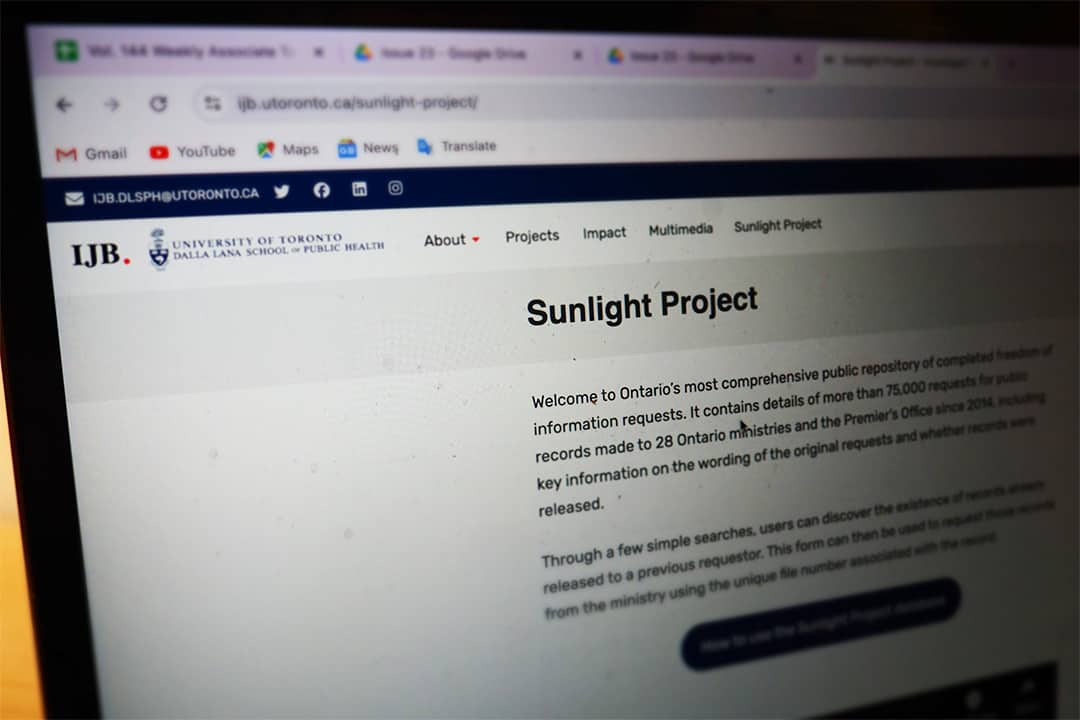The Investigative Journalism Bureau at the Dalla Lana School of Public Health and U of T libraries recently released a collaborative project to make government information more accessible, particularly to Ontario students.
The Sunlight Project is a free-to-the-public database that consolidates the details of over 75,000 freedom of information (FOI) requests individuals have made to the offices of the Ontario government’s 28 legislative assembly ministers since 2014. The database provides researchers with basic summaries of whether these requests could uncover useful information and helps users figure out how to access previously uncovered data via a simple keyword search.
The site debuted in January 2024.
What exactly is freedom of information law?
FOI laws ensure that individuals can access information held by the government. In a 1946 resolution, the United Nations recognized freedom of access to information as a fundamental human right and noted its importance in protecting other fundamental freedoms. Researchers in Canada have used FOI requests to uncover patterns of systemic racism, incidents of government corruption, and human rights abuses.
However, how readily people can access this information depends on the quality of a government’s FOI system.
As part of its Secret Canada project, The Globe and Mail has documented issues with Canada’s FOI system — from exorbitant fees to inadequate resources for FOI units to delays in addressing requests. The Centre for Law and Democracy — a Canadian-based non-profit that educates the public on and researches the human rights that underpin democracy — ranks Canada 52nd globally of the 140 countries it has examined in ensuring the right to information.
To access Ontario government records, a requester must submit any requests for information from provincial ministries, agencies, or post-secondary institutions based on a process laid out in the Freedom of Information and Protection of Privacy Act (FIPPA). The organization from which they request documents must respond within 30 days.
Public institutions’ FIPPA units can exclude information based on “advice or recommendations” made by government officials. These units often withhold government contacts. In contrast, the United States government often proactively publishes these contracts with companies online.
According to FIPPA coordinators interviewed by The Globe and Mail, many coordinators receive little training in understanding the nuances of the Act. Although these requests always cost five dollars to file initially, because of the costs of coordinators’ labour, receiving the information can cost requesters thousands of dollars.
Nicholas Worby — a U of T government information and statistics librarian — explained that he’s worked with students who need government information for their PhD dissertations or masters theses and struggled with the system. “I’ve had a few PhD students who have tried to make use of FOI data in their research and have failed, mostly because of timelines and the cost,” he said in an interview with The Varsity.
Shedding light on Ontario information
Enter the Sunlight Project. The database consolidates requests to help people navigate Canada and Ontario’s FOI systems, reminiscent of the “open by default” system found in the US where the government is obligated to proactively release any information that its freedom of information laws would allow.
According to Worby, the site is organized so that “people could save money and time,” which is crucial for students burdened by timelines and budgets. To find relevant information uncovered by previous FOI requests, users enter keywords related to their subject of inquiry into the search bar. Rather than going through the 30-day plus process of making an original FOI request that might not even return helpful results, the database automatically directs users to existing inquiries and a summary of what people who made these earlier inquiries received.
The database compares a multitude of uncovered data, and by comparing summaries from different requests, users can narrow down the scope of their inquiry.
If the researcher finds an uncovered source containing the data they hope to find, they can click the “copy information” button to copy all request details to the clipboard. The “request records” button redirects them to the online FIPPA request platform, where they can resubmit the request to hopefully receive the same files as the original requester received.
These options aim to simplify the requesting process and prevent mistakes first-time users often make when filing FIPPA requests. According to Worby, a standard error first-time FIPPA requesters make is setting up requests that are too broad for their time limit and budget.
But what if the information the researcher is searching for has yet to be uncovered? Worby hopes that the Sunlight Project will educate users about the requesting process and inspire first-time users to file more requests. “From my perspective, you can get a little more insight into what it takes to make a well-crafted request, to see how to get the records that you want,” he explained.
Worby advised students not to be intimidated by the FOI system. “If you’re looking for government information or data from the government, just because it’s not on the website or you can’t find it in the library catalogue doesn’t mean you should stop looking,” he said. He also encouraged students to contact a librarian if they need further research help and assured them that the library staff is more than willing to help.



No comments to display.